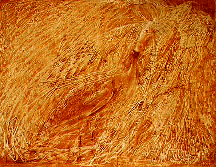POEMS ON PAINTINGS
Ekphrasis - “Description” in Greek. An ekphrastic poem is a vivid description of a scene or, more commonly, a work of art. Through the imaginative act of narrating and reflecting on the “action” of a painting or sculpture, the poet may amplify and expand its meaning.-

The Man with the Blue Guitar, Wallace Stevens (1937)
The man bent over his guitar,
A shearsman of sorts. The day was green.
They said, “You have a blue guitar,
You do not play things as they are.”
The man replied, “Things as they are
Are changed upon the blue guitar.”
And they said then, “But play, you must,
A tune beyond us, yet ourselves,
A tune upon the blue guitar
Of things exactly as they are.”
II
I cannot bring a world quite round,
Although I patch it as I can.
I sing a hero’s head, large eye
And bearded bronze, but not a man,
Although I patch him as I can
And reach through him almost to man.
If to serenade almost to man
Is to miss, by that, things as they are,
Say that it is the serenade
Of a man that plays a blue guitar.
The Disquiting Muses - de Chirico's painting review in Wikipedia
.png)
Cézanne painted around 20 views of L'Estaque, a fishing village just west of Marseille. These show the change of seasons and the shifting patterns of light at different times of day. However, the artist strove to achieve a sense of timeless monumentality that he felt was missing from the work of the Impressionists. Here Allen Ginsberg looks beyond what he believes the painting merely describes and toward a transcendent reality that "doesn't occur on the canvas". Beyond the bay, and away from the foreground where we find "time and life / swept in a race", is, he says "Heaven and Eternity".

Landscape with the Fall of Icarus, Pieter Bruegel the Elder, 1558
It takes a while for us to spot the pale legs kicking in the green sea to the right of the picture, since Bruegel’s great painting shows the fall of Icarus as an incidental occurrance, not the main event of this scene. But the insignificance of human suffering to the universe is indeed its theme. The plowman carries on with his task, while the “expensive, delicate ship”, after no doubt witnessing the incident, had “somewhere to get to and sailed calmly on.”
Musée des Beaux Arts, W. H. Auden (1938)
About suffering they were never wrong,
The Old Masters: how well they understood
Its human position; how it takes place
While someone else is eating or opening a window or just walking dully along;
How, when the aged are reverently, passionately waiting
For the miraculous birth, there always must be
Children who did not specially want it to happen, skating
On a pond at the edge of the wood:
They never forgot
That even the dreadful martyrdom must run its course
Anyhow in a corner, some untidy spot
Where the dogs go on with their doggy life and the torturer's horse
Scratches its innocent behind on a tree.
In Brueghel's Icarus, for instance: how everything turns away
Quite leisurely from the disaster; the plowman may
Have heard the splash, the forsaken cry,
But for him it was not an important failure; the sun shone
As it had to on the white legs disappearing into the green
Water; and the expensive delicate ship that must have seen
Something amazing, a boy falling out of the sky,
Had somewhere to get to and sailed calmly on.


The wounded wilderness of Morris Graves
is not the same wild west
the white man found
It is a land that Buddha came upon
from a different direction
It is a wild white nest
in the true mad north
of introspection
where 'falcons of the inner eye'
dive and die
glimpsing in their dying fall
all life's memory
of existence
and with grave chalk wing
draw upon the leaded sky
a thousand threaded images
of flight
A tempera on paper of Morris Graves, Bird in the Spirit (1943) is the surce of inspiration for Ferlinguetti's poem «The wounded wilderness of Morris Graves»
It is the night that is their 'native habitat'
these 'spirit birds' with bled white wings
these droves of plover
bearded eagles
blind birds singing
in glass fields
these moonmad swans and ecstatic ganders
trapped egrets
charcoal owls
trotting turtle symbols
these pink fish among mountains
shrikes seeking to nest
whitebone drones
mating in air
among hallucinary moons
And a masked bird fishing
in a golden stream and an ibis feeding
~on its own breast'
and a stray Connemara Pooka'
(life size)
And then those blown mute birds
bearing fish and paper messages
between two streams
which are the twin streams
of oblivion
wherein the imagination
turning upon itself
with white electric vision
refinds itself still mad
and unfed
among the hebrides
.png)
Analyses of poem and painting:
https://www.moma.org/learn/moma_learning/vincent-van-gogh-the-starry-night-1889/
https://www.yourfireshoes.com/the-starry-night-anne-sexton/
https://www.enotes.com/topics/starry-night
http://www.vggallery.com/visitors/002.htm
